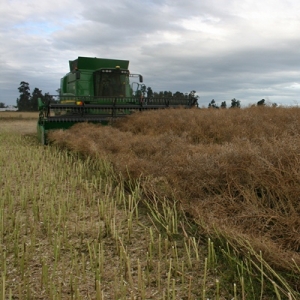AUSTRALIA’S GROWERS are grabbing four-six weeks autumn or winter grazing off oilseed rape crops with no impact on grain yield, CSIRO agronomist John Kirkengaard told growers at Crops 2014.
“It adds to the bottom line and helps pay for the canola crop up front.”
In some of the colder regions growers’ long-season EU-bred winter cultivars sown in February or March are stretching that grazing window to three months “and they’re still getting reasonable yields at the end,” he added.
FAR has been investigating the potential to replicate that here as most growers are using those cultivars anyway.
“There was no significant difference in grain yield from grazing off about 2000kg
of dry matter [per hectare] in late May and June,”
FAR’s Jen Linton told the field day crowd.
“But there was a significant difference [reduction] when we grazed too hard, for too long, beyond stem elongation.”
Due to difficulties sourcing sheep to graze trials in winter 2013, plots were mown instead and “looked really good” coming into harvest, said Linton. However, a windstorm wrecked the trial, thrashing so much seed out of the pods of mown and untouched plots that the data was meaningless. Linton’s hoping similar work this year, including experiments removing just the main raceme, will come to fruition.
“Oilseed rape can compensate very well for defoliation if it has time.”
Grazing with cattle hasn’t been attempted, the concern being they would be too hard on the crop and soil, particularly in wet weather.



















